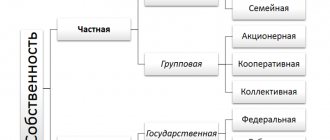The grounds for termination of property rights should be understood as reasons and circumstances in the presence of which property cannot exist as a property right.
The norms of Article 235 of the Civil Code of the Russian Federation are general in relation to other articles of Chapter 15 of the Civil Code of the Russian Federation. This article discusses the grounds for termination of property rights, which can be classified into voluntary and forced, compensated and gratuitous. In addition, grounds for termination of property rights are provided, which may not depend on the will of the subjects of civil legal relations, in particular the death or destruction of property, for example, by virtue of Art. 211 of the Civil Code of the Russian Federation (risk of accidental loss of property).
Article 235 of the Civil Code of the Russian Federation contains an exhaustive list of grounds for termination of property rights. Taking into account the volitional criterion (or the nature of the loss of property), the following grounds are identified that terminate the right of ownership:
- at the will of the owner (clause 1 of article 235, article 236 of the Civil Code of the Russian Federation), i.e. on a voluntary basis;
- against the will of the owner (clause 2 of article 235, article 237 - 243 of the Civil Code of the Russian Federation), i.e. forcibly.
Article 235. Grounds for termination of ownership rights
“Review of the practice of the Constitutional Court of the Russian Federation for 2017” 16. By ruling No. 1163-O dated June 6, 2021, the Constitutional Court revealed the meaning of the provisions of subparagraph 8 of paragraph 2 of Article 235 of the Civil Code of the Russian Federation, as well as part 1 of Article 4, part 3 of Article 16 , Article 17 and Part 2 of Article 18 of the Federal Law “On control over the compliance of expenses of persons holding public positions and other persons with their income.”
Determination of the Judicial Collegium for Administrative Cases of the Supreme Court of the Russian Federation dated February 21, 2019 N 46-APG18-47
In accordance with paragraph 1 of Article 235 of the Civil Code of the Russian Federation (hereinafter referred to as the Civil Code), the right of ownership is terminated when the owner alienates his property to other persons, the owner renounces the right of ownership, the destruction or destruction of property and in the event of loss of ownership of property in other cases provided for by law. Paragraph 2 of this article provides for cases of forced seizure of property from the owner.
Appeal ruling of the Judicial Collegium for Administrative Cases of the Supreme Court of the Russian Federation dated June 14, 2019 N 78-APA19-10
The non-state educational institution of higher professional education "St. Petersburg Humanitarian University of Trade Unions" (hereinafter - NOU VPO "St. Petersburg Humanitarian University of Trade Unions") filed an administrative claim with the St. Petersburg City Court to declare these provisions invalid, pointing out their contradiction with the normative legal acts of greater legal force, namely paragraph 1 of article, paragraph 1 of article, paragraph 2 of article 235, paragraph 3 of article 299, articles 1064, 1065, 1069 of the Civil Code of the Russian Federation; paragraph 3 of article 2, paragraph 3 of article 3, subparagraph 2 of paragraph 1 of article 9, articles 10, 56 of the Land Code of the Russian Federation; paragraphs 8 and 9 of Article 1, Part 3 of Article 3, Part 1 of Article 4, Article 7, Part 8 of Article 36 of the Town Planning Code of the Russian Federation, Subparagraphs 1 and 2 of Part 1 of Article 15 of the Federal Law of July 26, 2006 N 135-FZ “On protection of competition."
Determination of the Judicial Collegium for Civil Cases of the Supreme Court of the Russian Federation dated July 30, 2019 N 4-КГ19-26
According to paragraph 1 of Article 235 of the Civil Code of the Russian Federation, the right of ownership terminates when the owner alienates his property to other persons, the owner renounces the right of ownership, the destruction or destruction of property and when the right of ownership to property is lost, in other cases provided for by law.
Ruling of the Supreme Court of the Russian Federation dated October 4, 2019 N 309-ES19-16438 in case N A07-37785/2017
Canceling the court decision and satisfying the claims, the appellate court, with which the district court agreed, guided by articles 131, 235 of the Civil Code of the Russian Federation, the provisions of the Federal Law of July 13, 2015 N 218-FZ “On State Registration of Real Estate”, paragraphs 52, 53 Resolution of the Plenum of the Supreme Court of the Russian Federation and the Plenum of the Supreme Arbitration Court of the Russian Federation dated April 29, 2010 N /22 “On some issues arising in judicial practice when resolving disputes related to the protection of property rights and other property rights”, having examined and assessed the materials presented in case evidence in accordance with the provisions of Article 71 of the Arbitration Procedural Code of the Russian Federation, taking into account the expert opinion dated October 27, 2017 N 22/18 (17) and the conclusion dated May 21, 2018 N 18-18 of the forensic examination carried out within the framework of this dispute, from which follows that the object erected by the concern is not a disputed object (collar building), built in 1964, came to the conclusion that the disputed structure ceased to exist (destruct).
Ruling of the Supreme Court of the Russian Federation dated October 21, 2019 N 310-ES19-17938 in case N A83-10660/2017
The applicant believes that the property left the Company’s possession illegally and against his will, which led to a depreciation of the market share of shares in the authorized capital; Articles 235, 306 of the Civil Code of the Russian Federation (hereinafter referred to as the Civil Code of the Russian Federation) are subject to application to the legal relations of the parties.
Ruling of the Supreme Court of the Russian Federation dated October 25, 2019 N 306-ES18-17082 in case N A57-6548/2017
By canceling the judicial acts and sending the case for a new trial, the cassation court, without making any decision on the merits of the dispute, pointed out the need for the court of first instance to properly assess the factual circumstances of the case and make a reasoned decision, taking into account the application and interpretation of Articles 235, 239.2 of the Civil Code Code of the Russian Federation, parts 1, 2, 10 of Article 32 of the Housing Code of the Russian Federation, Articles 56.2, 56.3, 56.10 of the Land Code of the Russian Federation, paragraph 1 of Article 18 of the Federal Law of December 21, 1994 N 68-FZ “On the protection of the population and territories from emergency situations of natural and man-made nature", paragraph 22 of the resolution of the Plenum of the Supreme Court of the Russian Federation dated 07/02/2009 N 14 "On some issues that arose in judicial practice when applying the Housing Code of the Russian Federation", resolution of the Government of the Russian Federation dated 01/28/2006 N 47 "On approval of the Regulations on recognizing premises as residential premises, residential premises unsuitable for habitation and an apartment building as unsafe and subject to demolition or reconstruction,” as well as taking into account the Review of Judicial Practice of the Supreme Court of the Russian Federation No. 1 (2014), approved by the Presidium of the Supreme Court of the Russian Federation on December 24, 2014 , and the decision of the Volzhsky District Court of Saratov dated May 16, 2016 in case No. 2A-2178/2016 that entered into legal force.
Determination of the Judicial Collegium for Economic Disputes of the Supreme Court of the Russian Federation dated November 19, 2019 N 308-ES19-12842 in case N A32-8838/2018
In accordance with paragraph 1 of Article 235 of the Civil Code of the Russian Federation, the right of ownership terminates when the owner alienates his property to other persons, the owner renounces the right of ownership, the destruction or destruction of property and when the right of ownership to property is lost in other cases provided for by law.
Ruling of the Supreme Court of the Russian Federation dated December 12, 2019 N 305-ES19-22265 in case N A40-197783/2018
Having assessed the evidence presented in the case materials according to the rules of Articles 65 and 71 of the Arbitration Procedural Code of the Russian Federation, having analyzed the terms of the lease agreement dated September 18, 2013 N M-05-043244, the court of first instance recognized the fact of the defendant’s failure to use the disputed land plot in accordance with its intended purpose in connection with the demolition of real estate objects belonging to it, and, guided by Article 235, paragraphs 1, 2 of Article 451, 606 of the Civil Code of the Russian Federation, based on the fact that the company’s ownership of these objects had ceased, came to the conclusion that it was subject to termination and the right to use the land plot on which the specified buildings were located, which arose in him by virtue of previously effective Articles 35, 36 of the Land Code of the Russian Federation and the current Article 39.20 of the Land Code of the Russian Federation.
Determination of the Judicial Collegium for Civil Cases of the Supreme Court of the Russian Federation dated December 3, 2019 N 41-КГ19-43
According to paragraphs 1 and 2 of Article 235 of the Civil Code of the Russian Federation, the right of ownership terminates when the owner alienates his property to other persons, the owner renounces the right of ownership, the destruction or destruction of property and when the right of ownership to property is lost in other cases provided for by law. Forced confiscation of property from the owner is not permitted, except in cases where the law provides for such confiscation.
Ruling of the Supreme Court of the Russian Federation dated January 25, 2019 N 306-ES18-24037 in case N A06-3630/2017
The courts of the first and appellate instances, having examined and assessed, according to the rules of Article 71 of the Arbitration Procedure Code of the Russian Federation, the evidence presented in the case materials, guided by Article 16 of the Arbitration Procedure Code of the Russian Federation, Article 235 of the Civil Code of the Russian Federation, Articles 1 and 35 of the Land Code of the Russian Federation, the explanations given in paragraph 52 of the resolution The Plenum of the Supreme Court of the Russian Federation and the Plenum of the Supreme Arbitration Court of the Russian Federation dated April 29, 2010 N /22 “On some issues arising in judicial practice when resolving disputes related to the protection of property rights and other property rights”, came to the conclusion that there are grounds for termination of the right of ownership of the Russian Federation and the right of permanent (perpetual) use of the Institution for a land plot with cadastral number 30:01:150103:1 based on the following: The Arbitration Court of the city of Moscow, by decision of May 21, 2014 in case No. A40-40656/2012, approved a settlement agreement , concluded between the Administrations and the Ministry of Defense, which resolves disagreements between the parties regarding real estate; This agreement also established the obligation of the Ministry of Defense to transfer free of charge a land plot with an area of 235,833 square meters to the ownership of the municipal formation "City of Akhtubinsk". m with cadastral number 30:01:150103:13, located at the address: Astrakhan region, Akhtubinsk; at the time of approval of the settlement agreement, the disputed land plot with cadastral number 30:01:150103:1, on which the store building is located, owned by a third party, was part of the original plot with cadastral number 30:01:150103:13, while on this site there are no real estate objects necessary to ensure the activities of federal executive authorities in the field of defense and state security, therefore, there were no grounds for registering the right of federal property and the right of permanent (indefinite) use of the specified land plot.
Seizure of property
The Civil Code contains a fairly comprehensive list of cases in which forced deprivation of the owner’s rights to a thing is allowed. All these options, however, must not contradict Art. 35, part 3 of the Constitution. It states that no one can be deprived of property except by a court order. When the owner is deprived of property, the basis for termination of ownership rights is the owner’s improper behavior. In addition, the law establishes that it is allowed to seize a thing from the owner regardless of his actions, if this is due to the interests of the country or society.
Nationalization
It represents the conversion of property that organizations and citizens have into the property of the state. The Civil Code does not describe the reasons for nationalization. However, they are determined by state interest and do not depend on the will of the owners. Nationalization is permitted subject to certain conditions. In particular, this basis for termination of property rights involves compensation for losses and the value of property in the manner regulated by Art. 306 Civil Code. However, the reference to this normative act does not fully comply with the requirements of Art. 35 of the Basic Law. It states, in particular, that forced deprivation of property of citizens and organizations can be carried out only subject to equivalent and preliminary compensation.
As is known, the provisions of the Constitution have undoubted priority in comparison with other norms. This means that when the Federal Law on the confiscation of material assets from organizations and citizens (nationalization) is adopted, its provisions must define the procedure for equivalent, preliminary compensation of property. The rules also provide for compensation for the cost of the share. After compensation, the owner loses rights to it. According to a court decision, the owner loses the opportunity to use, dispose of, and possess an unmanaged item. A claim for this is filed by the territorial self-government body.
Requisition
In case of natural disasters, accidents, epizootics, epidemics and other circumstances of an emergency nature, property may be confiscated from organizations and citizens in the interests of society in accordance with the decision of government agencies. In this case, the alienation procedure must be observed, according to which the owner is reimbursed the cost of the thing (object). The owner can challenge in court the amount of compensation (reimbursement) for the requisitioned property. If the circumstances that caused the alienation cease, the owner has the right to demand the return of ownership in court. This case differs from others in that it refers to emergency situations in which it is necessary to urgently confiscate a thing from a person. The purpose of requisition is not to suppress the actions of the owner, but to ensure security, save property, destroy the source of infection, etc.
In this regard, the seizure is carried out administratively by appropriate decision without equivalent preliminary compensation of the cost. This, in turn, contradicts Art. 35 of the Constitution. The requisitioned item becomes state property and is transferred into the possession of special bodies. The conditions and procedure by which the seizure is carried out must be regulated by a special normative act. The valuation of requisitioned property may be challenged by the owner in court. According to the adopted new provision, the owner has the opportunity to demand the return of the seized item after the circumstances that provoked this fact have ended. The regulatory act does not define the property relations of the parties in the return process.
Land
In the system of property relations, there is such a thing as “determining the order of use.” In this case, we mean the allocation and subsequent transfer to the exclusive use and ownership of a part of the common property. The same procedure is established for a land plot. The allocated and transmitted part has a specific size and boundaries. In this case, individual fragments of land may or may not be kept in common use for passage or passage to the main structure or ancillary buildings and premises. The division of any property, in contrast to determining the order of use, when considering it in accordance with the norms of civil law, acts as one of the ways to terminate the right of ownership. In this case, several independent new ones are formed on the basis of the object.
This provision can be fully applied to land plots that constitute real estate. In accordance with this, the allotment can be divided if it belongs to persons by common ownership. When carrying out these actions, it is necessary to take into account the specifics of the procedure established in the Land Code. One of them is that the plot can be divided subject to its divisibility.
Confiscation
The law provides for cases in which property may be confiscated from the owner free of charge. The basis for this action, which entails the termination of property rights, is a court decision imposing sanctions for committing an unlawful act or other crime. In cases provided for by law, confiscation may be carried out administratively. Thus, the owner can appeal the decision to carry out the seizure to a judicial authority. Confiscation is prescribed as a criminal penalty when sentencing for crimes of particular gravity and committed for personal gain. Seizure of property in this way is carried out only in cases provided for in a special part of the Code of Criminal Procedure. Property that is necessary for the convicted person or his dependents, in accordance with the list established by the penal law, is not subject to confiscation.





